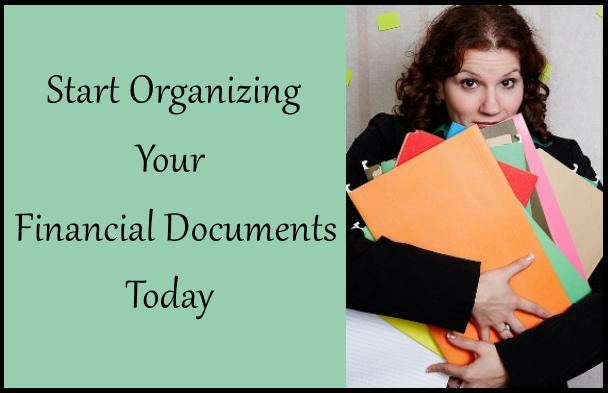Many years ago, as computers became more popular, there was a lot of talk about a “paperless society”. While that has happened in some respects, most days we still deal with a lot of paper based documents. A good example of this is your financial documents. Some of them may be eDocuments, but I bet you still have lots of paper to deal with too. When it comes to your financial documents would you say that you are well organized or that you toss everything in a pile hoping that you will find it if you ever need it?
Let’s talk about how to organize your stuff, including pay stubs, tax receipts, tax returns, bank statements, retirement account statements, and so on.
Organizing Your Financial Documents
Do you have a filing cabinet at home with individual file folders and hanging folders? If you just said no, your first step is to buy some.
They are available at any office supply store, or of course, online.
Also, if you do not have a filing cabinet, you can save some money by purchasing a portable plastic file box (shown further down).

Begin by creating hanging file folders and label them as follows:
Miscellaneous Receipts and Invoices
What do you do with receipts and invoices for your major purchases such as appliances, TV, computer, etc.?
Do you toss them or keep them?
Quite often it is important to keep them for warranty issues and it is equally important to keep them where you will easily find them months later.
Create a hanging file folder for miscellaneous receipts.
You can take it a step further and create individual file folders based on the types of receipts and invoices you have.
Create new folders as you work through each of the following categories.
Insurance Documents
Create a separate folder for life insurance documents, car insurance documents, home insurance and health insurance.
Investment Account Statements
Organize your investment account statements based on the financial institution and then in date order before filing them.
Household Accounts
Your household account folders should include a copy of your mortgage or rental agreement, along with home insurance and home equity loan statements.
Children’s Accounts
You may have started a college fund or savings account for your children and grandchildren. You should keep those statements in this folder so that you will have easy access to it in the future.
Retirement Account Statements
Figure out which ones you need to keep and organize these the same way you did for your investment statements.
Tax Returns
As you organize your financial documents, and prepare for tax season, make sure that you only keep copies of things that you really need.
Label a hanging folder with “Taxes” and then create a file folder for current tax receipts so that you will have them ready when it is time to do your tax return.
If you have multiple receipts for different categories create file folders for each category. Remember to put the year in the top right hand corner of the file folder too.
Create separate hanging file folders labelled with “Tax Returns”.
Label individual file folders by year, one for each past tax return. If you are not sure how long you need to keep past copies of your tax returns for, do a search online or ask your accountant.
Family Will and\or Trust
Include all copies of your Will and Trust documents, even if your lawyer already has a copy.
Make sure that the person that you appointed as Executor and Administrator in these documents knows exactly where to find them in your home. There is no sense doing these documents and then hiding them.
Gather Up Your Financial Documents

Now that you have all of your files labeled you need to go through your home and find all of these documents and bring them together on the kitchen table.
Organize them into piles based on the categories listed above.
Then organize them by date and put them into each corresponding file folder in your filing cabinet or file box.
I prefer this file box. It snaps shut and has a carry handle on top that makes it easy for me to carry with me, and to put in the closet when I do not need it.
You could also use it to carry your files to the accountant if you ever needed to.
Don’t avoid getting organized!
It will really only take you a few hours to do, and once you get it done, your financial documents will be organized for life, as long as you make it a habit to file new documents as you receive them.
(PIN IT)






